Dreaming of becoming a coach, but not sure where to start?
I remember feeling the same way. I felt stuck in my unfulfilling corporate job. At the same time, I didn’t know how to start my own business, let alone quit my job. But four months later, I found myself handing in my resignation letter with a 6-figure coaching business.
Want to know how I did it and you can, too? Here’s how to become a coach in 2024. (Know what type of coaching business you want to start? Read to the end to learn more about different coaching niches.)
You’ll learn:
- Why should you start coaching?
- How to become a coach even if you have a full-time job (use this simple, 3-step strategy)
- The 4 traits all successful new coaches have
- What type of coach do you want to become?
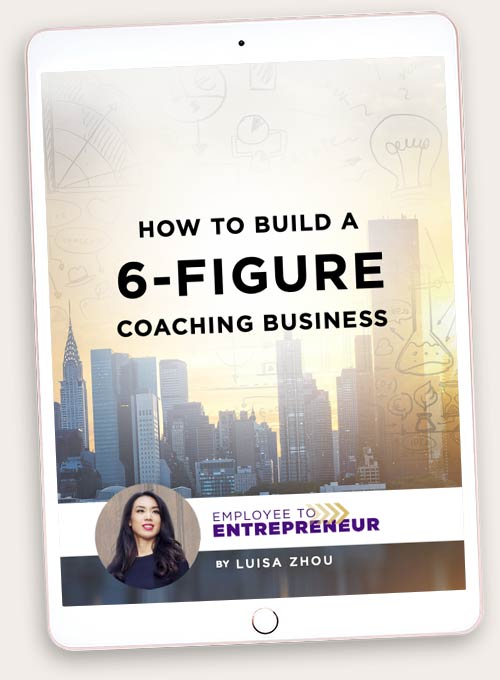
Want to Build a 6-Figure Coaching Business So You Can Achieve More Freedom?
When you sign up, you’ll also receive regular updates on building a successful online business.
1. Why should you start coaching?
Why do you want to start a coaching business? As a coach, you get to support and help people achieve their goals with the flexibility and freedom of being self-employed. That in itself sounds pretty sweet, right? But I’m getting ahead of myself. First, we need to make sure we’re on the same page of what coaching is and isn’t.
What does a coach do?
Coaching is a rapidly growing, billion-dollar industry. And no wonder: Coaches can be described as personal advisors and mentors, who help coachees develop their skills and achieve their goals.
My take on things?
As more people discover the power of getting personalized support, the industry will only continue to grow.
As a coach, you can help your clients in pretty much any niche. Health, career… Even in niches like fashion or food. It really comes down to what you have experience in and what you enjoy doing.
Here, I elaborate more on what coaching is:
A great perk is this:
You have an impact. As a coach, you keep your clients accountable to their goal. And research shows that accountability helps people achieve their goal.
Coaching can happen both online and offline. That means you’re either working with your clients anywhere in the world with the help of online tools or in person.
I prefer the online model. Why? Let’s take a look at the benefits of online coaching.
How do you become a coach online?
Before starting my own coaching business, I had gone through a few business models, including a 6-figure tutoring business and a payment app startup with million-dollar funding.
I knew one thing: I was done with the stress of working a corporate job, building an offline business, or growing a risk-heavy online tech startup.
My next business was going to be an online business so that I could decide my own hours and work flexibly from the comfort of my home.
And coaching is a great choice because you can start a business with your existing skills and relatively quickly build a profitable business. A coaching package can easily sell for $1,500-2,000. An ecommerce product is usually priced at around $20-100.
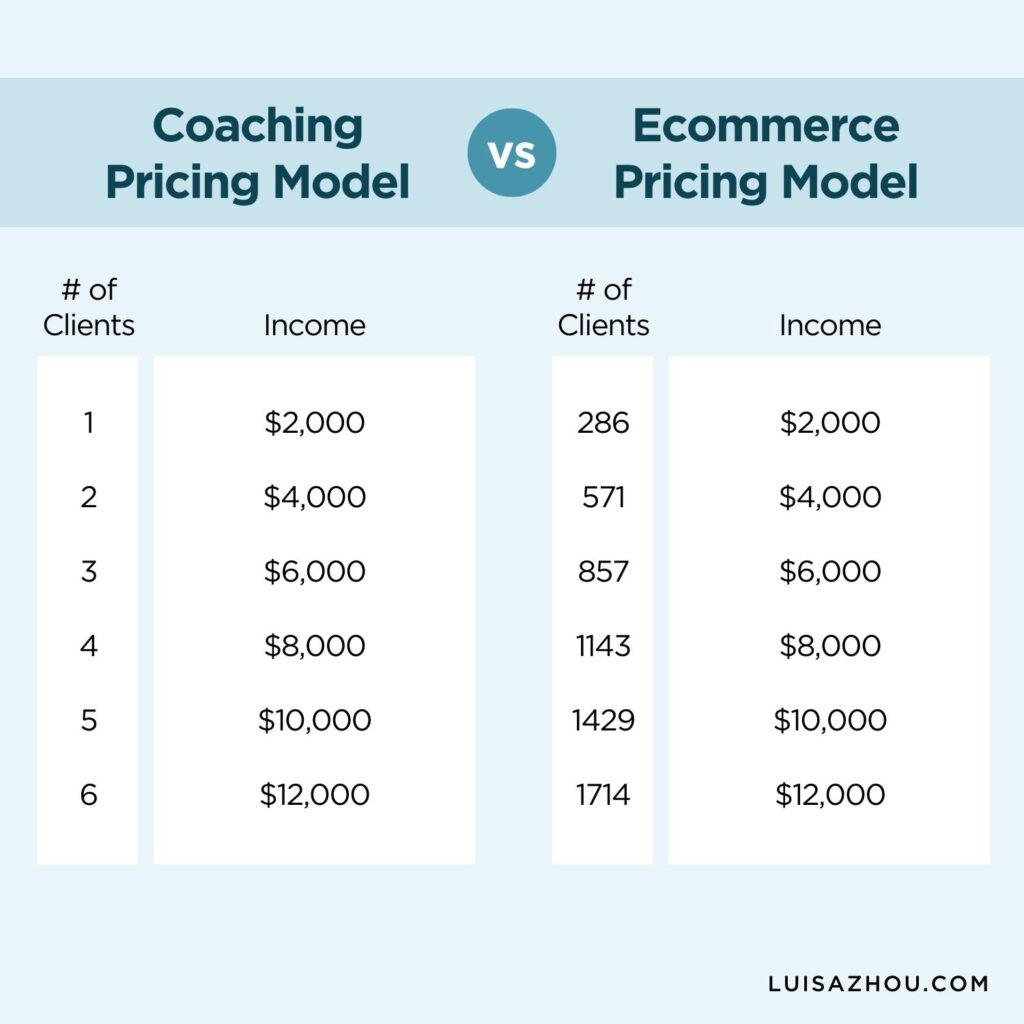
What’s more, something I lacked at my 9-5 job was purpose. But as a coach, your work can be really impactful because you helping people improve their lives every day.
How to know if YOU can start a coaching business
Now you know what benefits a coaching business has. But can YOU become a coach?
Good question. What you need for starting a coaching business is this:
A skill that helps your clients get results.
For example, as a health coach, you help your clients get healthier. As a career coach, you help them build their careers. And so on.
To figure out if you have enough experience, ask yourself: Have you helped yourself and/or someone else get results?
For example, if you want to become a health coach, have you lost weight and/or have you helped someone do it?
The way I did this was through trial-and-error. I started an Excel consulting and career coaching business (long story short: I didn’t enjoy working on them, but you can read more about it here).
Then, I realized that there were tons of entrepreneurs who needed help with their Facebook ads marketing. When I noticed just how many people were asking for help with this, I thought, “WIN!”
You see, at the time, I was working with Facebook ads every day in my day job. So, I tested my idea and started selling Facebook coaching.
Once a few people had said yes to working with me, I knew it was a good coaching niche.
2. How to become a coach even if you have a full-time job
How do you become a coach?
You might be thinking:
“I’d love to start a coaching business, but I’m in a 9-5. How can I start a coaching business when I’m already so busy?”
I hear you. I used to feel the same way.
When I was in a busy managerial job, I looked at all these business gurus who were telling me to do things the same way they had done them when growing their businesses 10 years earlier.
I was supposed to be active on social media, write blog posts, keep an email list, create videos, host webinars, and so forth. “I can do that,” I thought. But then I realized: It would take ages to build up my business, at least 2-3 years.
“There has to be a better way,” I figured.
Four months after starting my business, I had quit my day job and my business had made six figures in sales.
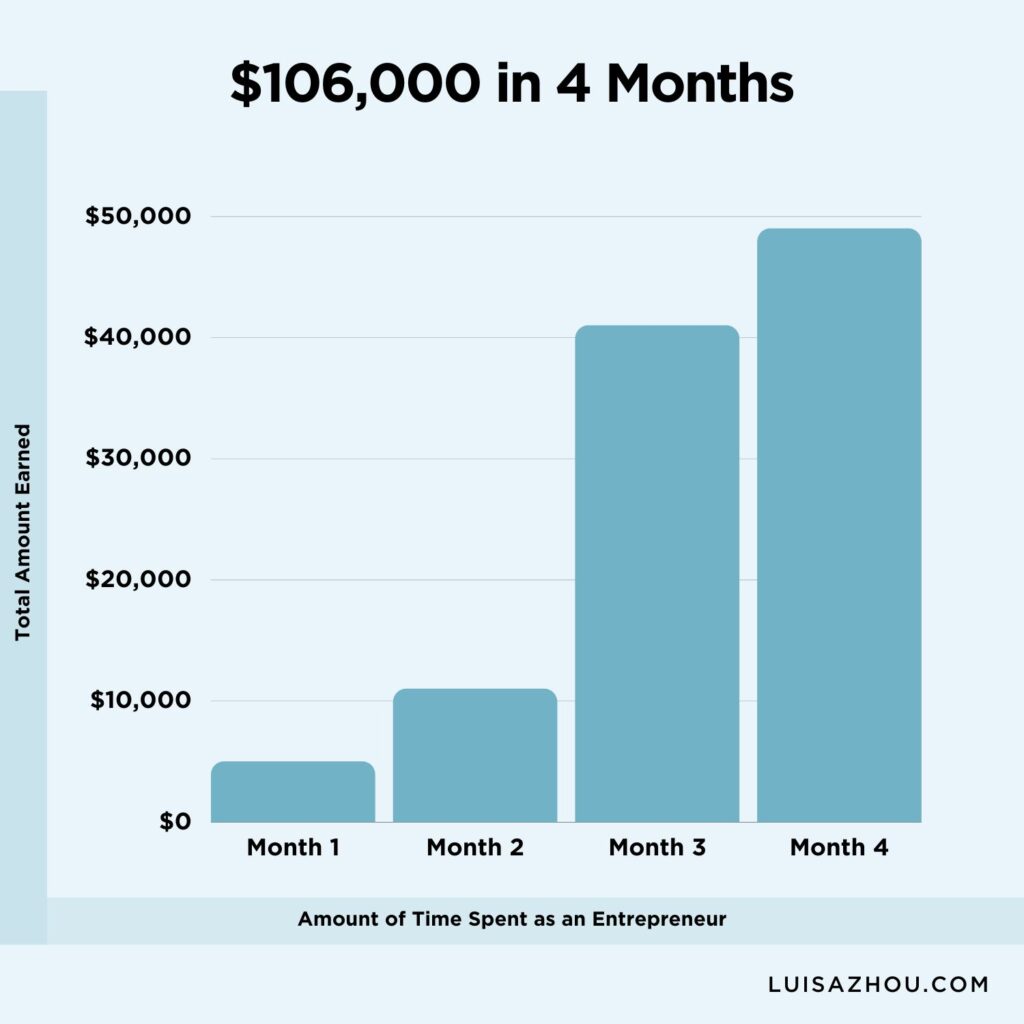
One year later, I was at $1 million.
Today, I’ve helped 1000s of people start their own coaching businesses.
What you DON’T need right now to become a coach
Look: Starting your coaching business can be pretty simple (even if it isn’t easy). You just have to know what to focus on.
#1: Coaching certification
The first thing you DON’T need right now is a coaching certification.
Yes, I know there’s this “myth” in the coaching industry that you need to be a professional certified coach.
The truth? You don’t, except for some very specific niches (mainly health and mental health-related niches).
It’s MUCH more important that you help your clients get results. Being a great coach is something you learn along the way. That’s also why you should start at a lower rate, earn your stripes, and successively move to a higher rate.
As a coach, you can ALWAYS become better. A certification won’t do that for you. In the worst case, you get stuck in working on your certification (and pay $1000s for it) when you could have worked with clients, helped them get results, and at the same time, learned how to become a better coach.
(However, if you know you want to become certified, I recommend that you take a look at what the International Coach Federation is offering.)
#2: A website
The second thing you don’t need right now is a website.
When I started my business, I didn’t have a website… And I made close to $20,000 before I built one.
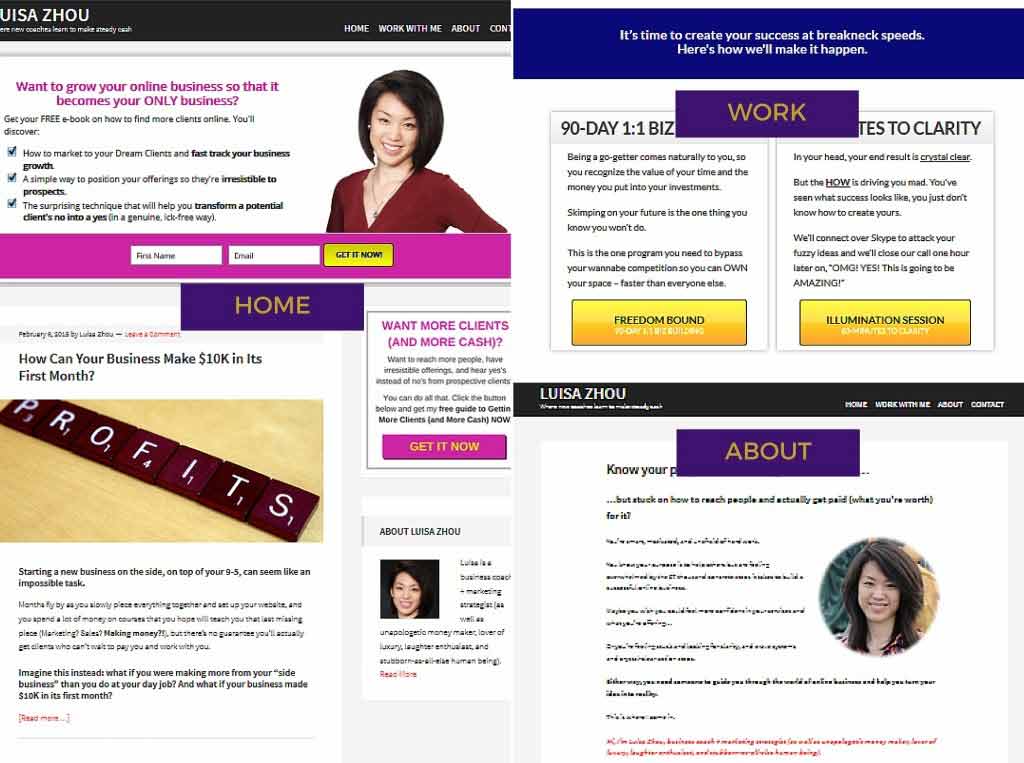
The mistake I see so many new coaching business owners make is to get caught up in creating their website. They spend money and time on perfecting it, but a beautiful website won’t help you grow your business.
Focus FIRST on getting paying clients. When you have a few clients, you can start working on other things, like your website and email list.
That’s the fastest way to becoming a coach and quitting your 9-5.

Want to Build a 6-Figure Coaching Business So You Can Achieve More Freedom?
When you sign up, you’ll also receive regular updates on building a successful online business.
How to find your first coaching clients
So how do you find your first customers?
The way I did this was very simple…
I basically went to where my potential clients were hanging out and started talking to them. In my case, as I was selling Facebook ads coaching to entrepreneurs, it was Facebook groups for business owners.
There, I started sharing a lot of value by posting interesting insights and ‘infotainment’ posts (sharing information and entertainment) and answering people’s questions.
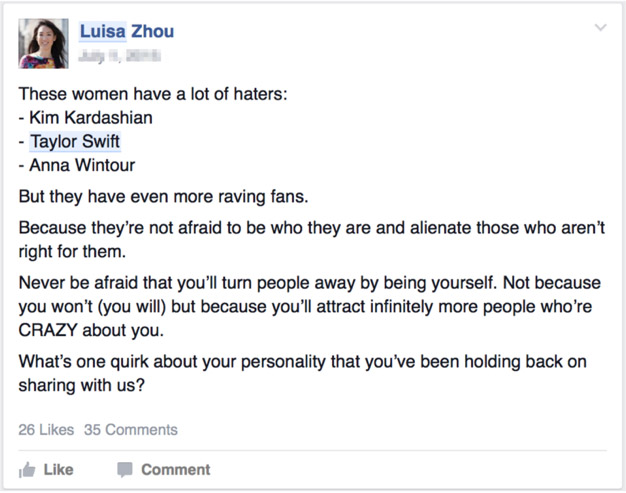
Eventually, this strategy got me to 6-figures in sales in four months. Here’s how I did it:
Step #1: Where do your clients hang out?
Step #1 for you is to go where your audience hangs out. This could be Instagram, LinkedIn, Reddit, YouTube, Facebook, Twitter, TikTok, or a niche-specific social platform.
Look at where people in your industry are hanging out. For example: Instagram and TikTok are great for health coaches because these platforms let you share before-and-after transformations.
Step #2: Share your content (yes, the world needs it!)
Now, it’s time to put yourself in front of your audience, build trust and sell your coaching package.
Over the next two weeks, go to your social media platform and share valuable content. To make this something you can juggle with your full-time job, schedule in 15-minute three times a day to get your posts out there and engage with your audience.
Want a few examples of what your content can look like?
1: Share tips and insights
The first type of post is an educational post. When I still had a Facebook group, I used to share my own insights and lessons from building my business(es). It can look something like this:
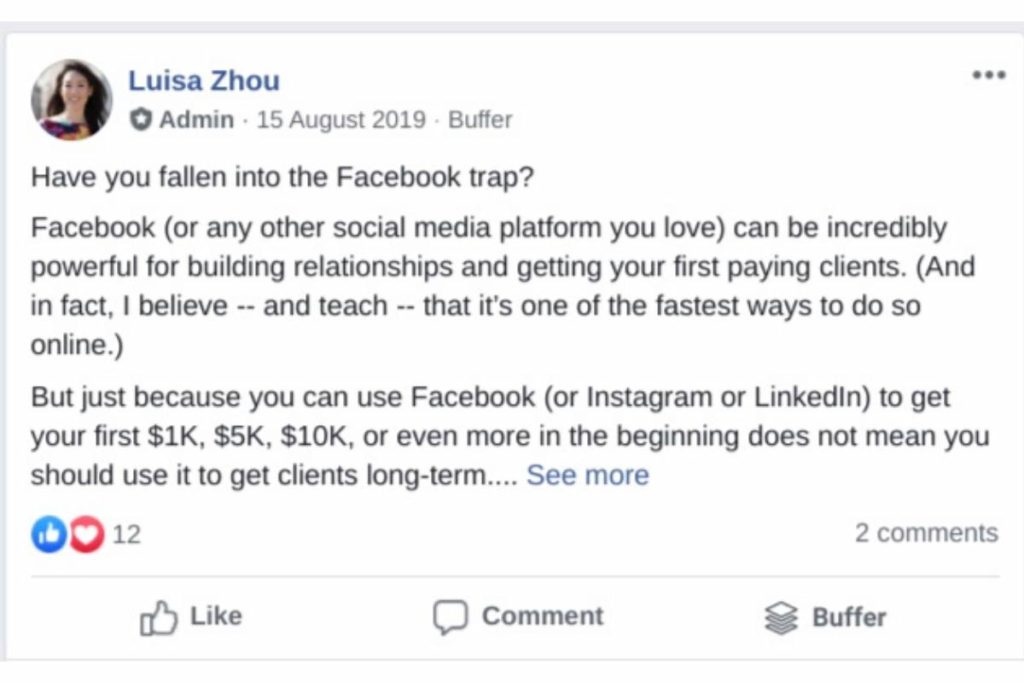
2: Be entertaining
People use social media as a break in their day and to get entertained. Don’t be afraid to show your personality and creating fun, relatable posts.
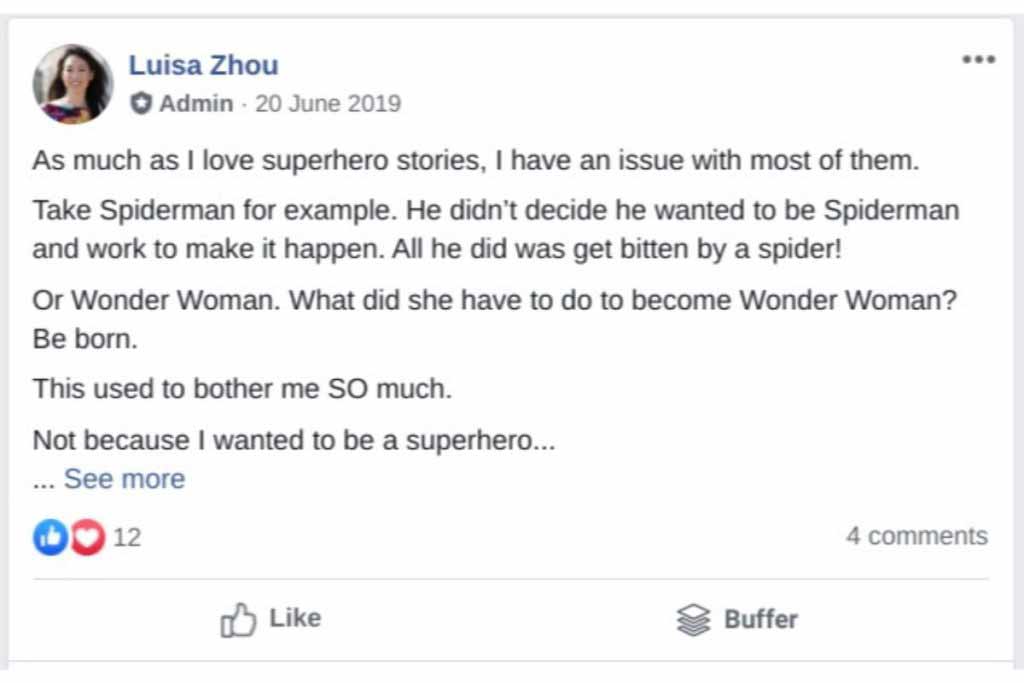
I love sharing content about some of the things that make me, me.
For example: I love TV shows. When I talk about the Kardashians, people can relate. They see me as a human. And that makes them see that my results can be their results, too.
3: Share livestreams
And finally, one of the most powerful posts you can put out there are livestreams. Sharing your content live is a great way to build a quick connection with people. After all, they see YOU, the real person, sharing advice on your coaching niche.
Here’s a live I did a few years back:
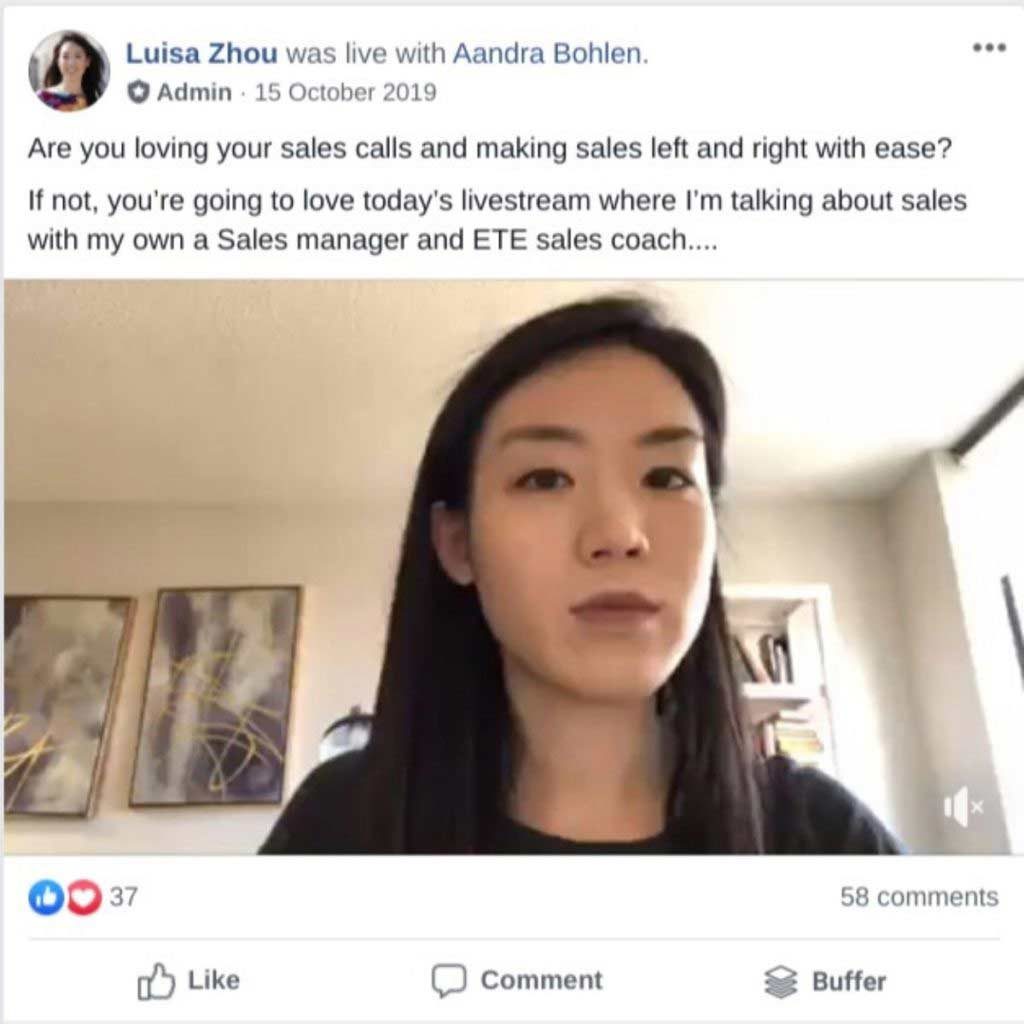
Step #3: Get on a call… and sell (yikes!)
Once you’ve done this for a few weeks, people will have started to notice you and the value of your services. Now, it’s time to offer a free coaching call.
This is a 15-minute call and the idea is that you coach someone through a simple and actionable block. For example, as a health coach, you can offer advice on how people can implement a simple health routine every day.
People get to “test” your coaching services and realize that you offer a lot of value in just 15 minutes. That way, it’s MUCH easier for them to sign up with you and start working with you.
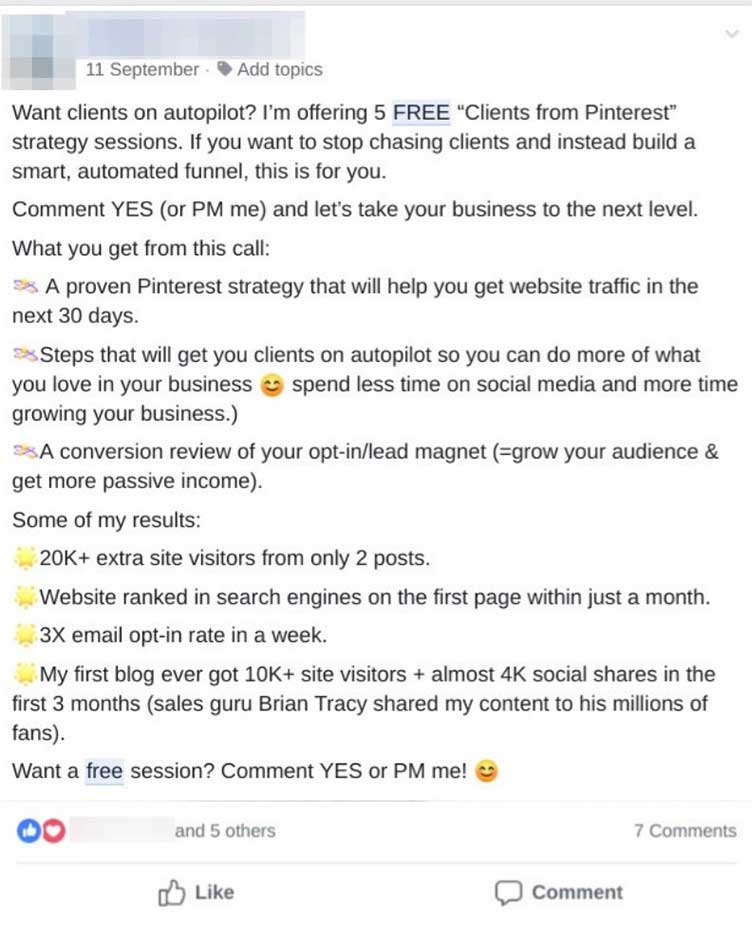
Of course, social media is just one place where you can find clients. Here are five more:
How to decide on your coaching rate
Now you know the steps to take to start a coaching business.
But something that can feel confusing is your rate.
WHAT should you ask for when you’re just starting out?
Start with a $1,500 3-month package. That’s a good, but low enough, rate for people to feel they can commit even if you’re new to coaching. And three months is the perfect length for helping someone get results.
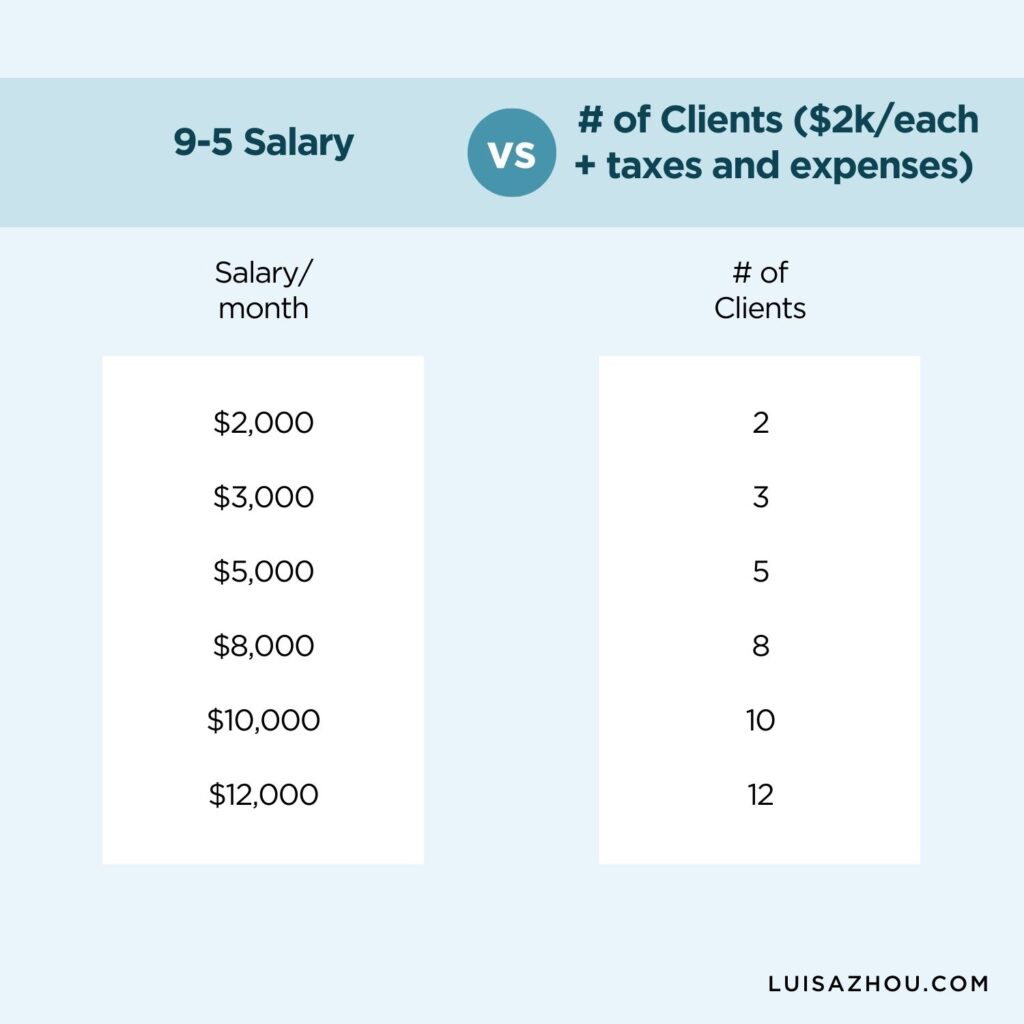
Once you have a few clients and results, you can progressively increase your rate.
3. The 4 traits all successful new coaches have
Over the past few years, I’ve helped 1000s of people start their coaching businesses with my coaching and course programs. During this time, I’ve realized that there are a few things that my top students have in common. These are:
1. Keep consistent (even when you don’t feel like it)
THE biggest reason people fail to build their business is that they don’t keep consistent.
Yes, you feel tired after work and the last thing you want to do is work even more.
But that’s when you sit down anyway to do the work… THAT’s how you become an entrepreneur.
When I was building my business (while working my demanding managerial job), I scheduled everything. And I mean everything!
My calendar would look something like this:
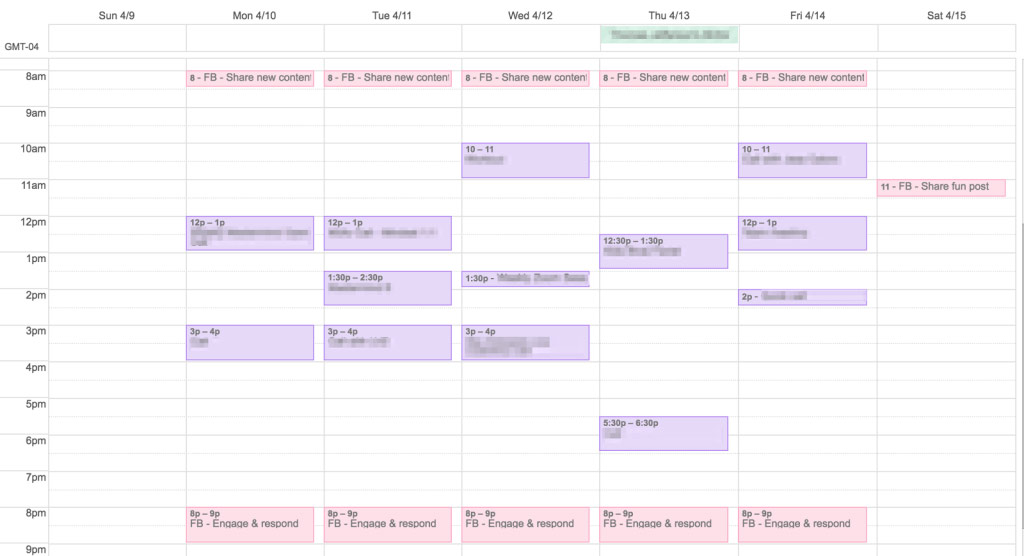
Because it was in my schedule (and that time had already been blocked off), I was able to consistently build my business.
2. Take action… fast!
Something else I notice that my top students always do is this:
They take action.
You see, when I give my students the roadmap to achieve their next goal, my most successful students implement things at once. While others worry about doing the task or failing, they get their tasks done.
Being a coach isn’t about doing everything perfectly. Instead, you just need to get it done.
3. Be a problem solver
You know how I can spot someone who will quickly build their coaching business?
Instead of asking, “Will this work for me…?”, they say:
“How can I make this work for me?”
So when others get defeated by rejection (which happens easily during a sales call), top students will look at what they can do better next time. Instead of getting discouraged, they get on the next sales call.
And look: I KNOW it’s tough to get rejection after rejection. When I started out, I got about 30 no’s in a row. It would have been easy to sigh and say, “Well, I guess I tried it and it didn’t work.”
But a few weeks later, I had made my first $5,000 sale.
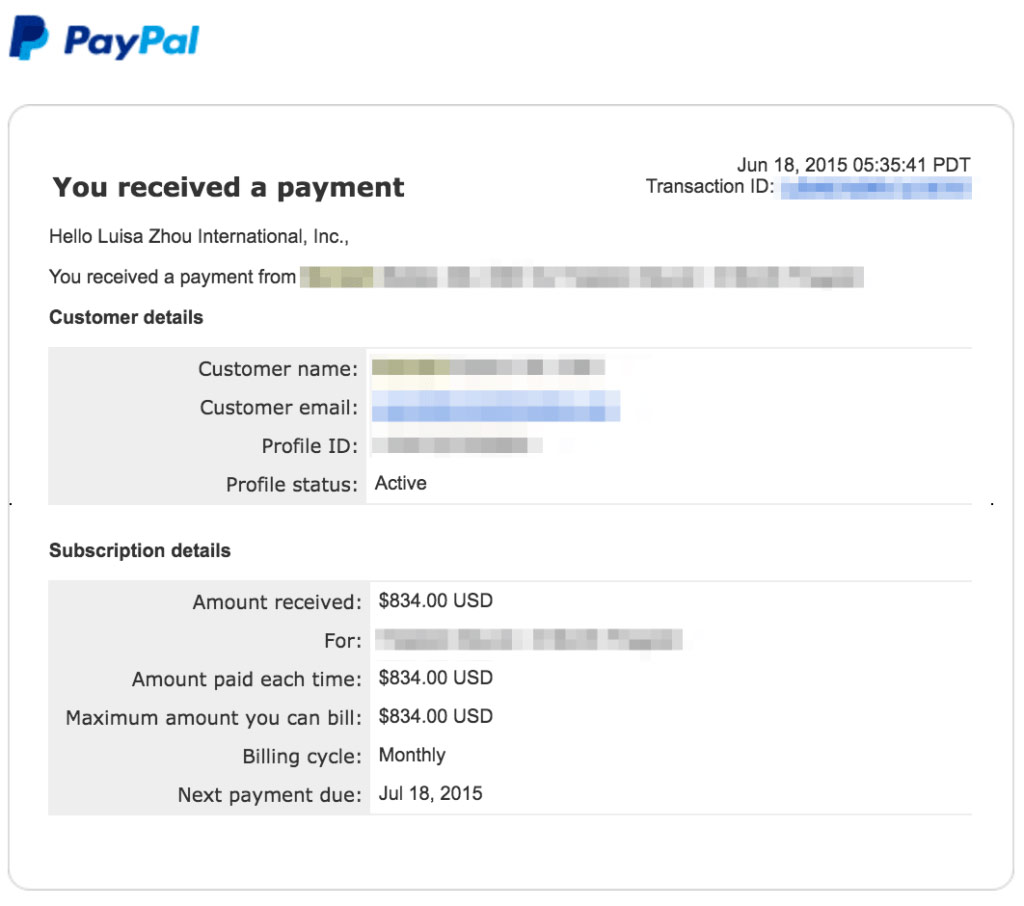
4. Think about your progress with this anchoring tip
Finally, top coaches think about their progress differently than others.
You have a goal, like becoming a coach and quitting your job. And you might have a goal of making $30,000 before handing in your notice.
When you’re building your business, it’s easy to look at your progress and think, “I’ve only made one sale of $1,500. That’s so far from $30,000. I’ll never get there!”
But top students think:
“Wow, a month ago I was at $0. Now I’m at $1,500. That’s amazing progress.”

Want to Build a 6-Figure Coaching Business So You Can Achieve More Freedom?
When you sign up, you’ll also receive regular updates on building a successful online business.
4. What type of coach do you want to become?
Now you know how to become a coach. But how do you start a coaching business in a specific niche? Let’s take a look:
How to become a life coach
Thinking about becoming a life coach? The thing is: I don’t recommend that you start a life coaching business.
Why? Because life coaching is too general. Not that many will pay a premium price for someone to coach them without having any specific goal in mind. That’s why you should define a life coaching niche you want to start. A few life coaching examples include a mindset coach or a stress coach.
Want to learn more? Read this in-depth guide on how to start a life coaching business.
How to become a health and wellness coach
Health coaching is HUGE. MarketWatch estimates that the global digital health market will be $504.4 billion in 2025.
And no wonder: As a health coach, you help your clients stay healthy, something that most people need help with whether it’s to feel better, stay fit, or lose weight.
Want to read more about starting a health coaching business? Read my guide here.
How to become a career coach
Career coaching is booming. And if you’re passionate about helping people advance in their careers, this can be the coaching niche for you.
Just look at my client Emily, who quickly built her 6-figure career coaching business Cultivitae. She helps people find better and more fulfilling jobs and get promotions and better salaries.
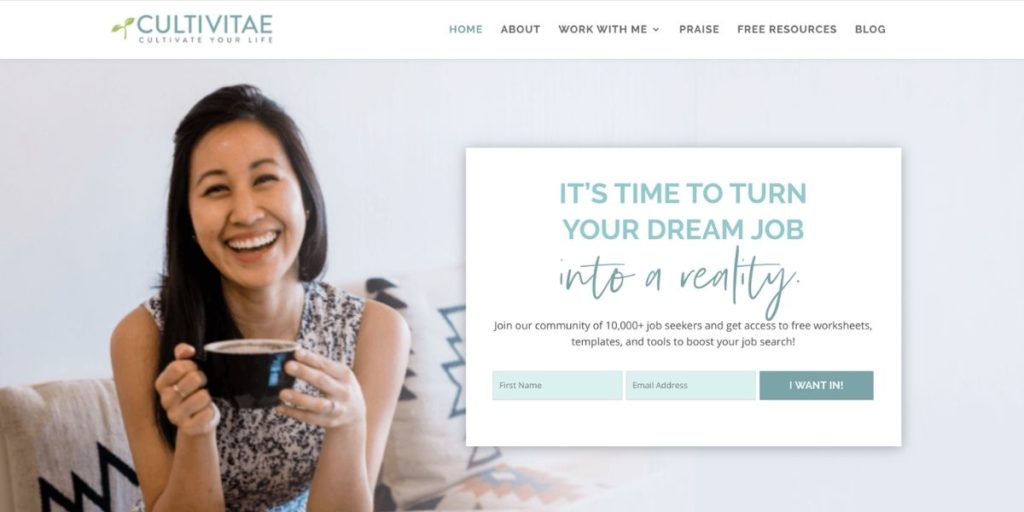
Want to start your own career coaching business? Read this in-depth guide.
How to become a mindset coach
If you love helping others improve their mindset and confidence, mindset coaching could be something for you.
A mindset coach helps people break their old thought-patterns and reinstate new and transformative beliefs. People might be stuck in their relationships, money, jobs… And a mindset coach helps them overcome those blocks.
Who can become a mindset coach?
To become a mindset coach, you need to have overcome your own mindset struggles. Alternatively, you might be trained in mindset coaching or have worked in a related field.
As a mindset coach, you might work with a specific niche, like entrepreneurs or people who want to improve their money mindset. For example, my client Spencer helps entrepreneurs work on their mindset so that they can build their businesses. Spencer has years of experience working with mindset coaching in the corporate world.
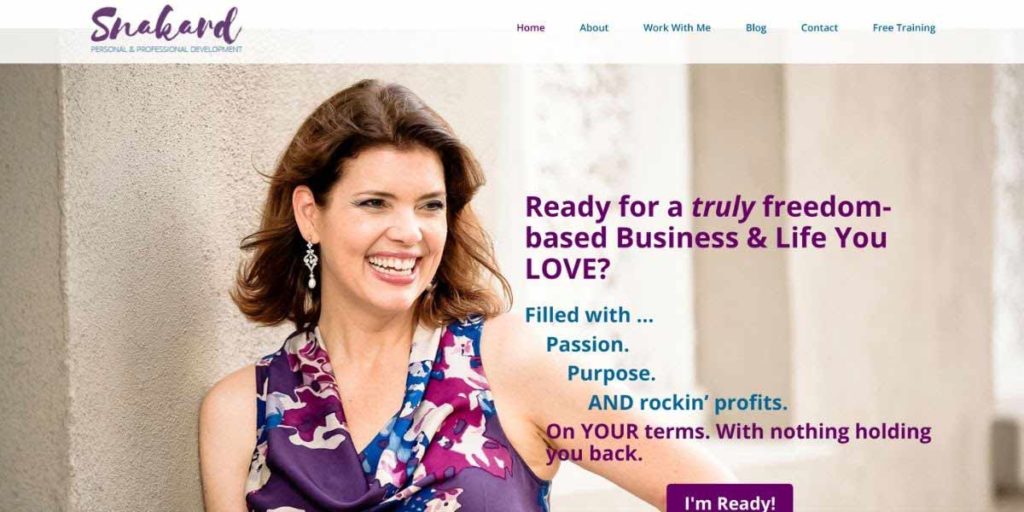
Where do you find clients as a mindset coach?
Some of the platforms that might work for mindset coaches include LinkedIn, YouTube, Facebook, and Instagram. This is by no means an exhaustive list. My mindset coaching students have even found clients on platforms like WhatsApp. You can read more in this guide on becoming a mindset coach.
How to become a relationship coach
Love helping people find, well, love?
If yes, becoming a relationship or dating coach might be what you’re looking for. As a relationship coach, you help your clients either find a partner or improve their existing relationships.
You might focus on a specific niche, like women, men, LGBTQ, or even a religious group (who want to find a partner with the same faith). Or you might help people find love in a specific way, either online or offline.
Who can become a relationship coach?
Have you found a healthy relationship and you have a clear methodology for helping others do the same? Or maybe you’ve worked as a matchmaker before or have experience in a similar field (like family counseling)? In that case, you have what it takes to become a dating coach.
For example, my student Ruby Lee has built her own 6-figure relationship coaching business. She started out working for major companies like eHarmony and today, she works with high-quality men who want to attract more dates.
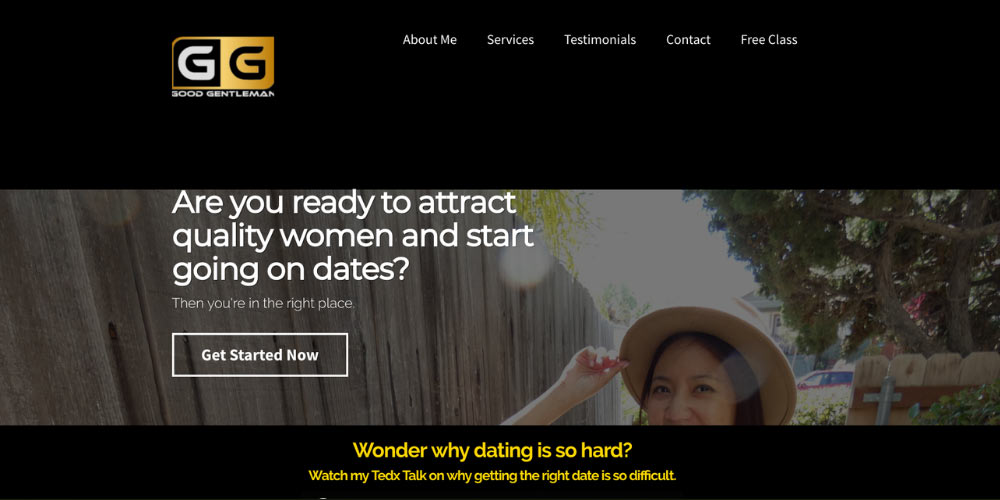
Where do you find clients as a relationship coach?
Relationship coaching clients hang out everywhere and your specific platform depends on your niche. For example, Reddit would be a pretty good bet if your clientele is male. Facebook groups or YouTube can also be great places to find your clients. Or visit offline events for your target clients.
Read more in my guide on becoming a relationship coach.
How to become a business coach
Have you started your own successful business and want to help others do the same? In that case, becoming a business coach is a possibility. For example, my student Kat, who first built her own successful online business, now helps entrepreneurs find profitable niches.
Who can become a business coach?
To build a coaching practice in this coaching field, you need to have experience of building other businesses successfully in the past. After all, you can’t really make a real difference without having done it yourself.
Where do you find clients as a business coach?
Your clients can be anywhere where entrepreneurs hang out. For example, Facebook, YouTube, Instagram or LinkedIn (or even offline). My guide on becoming a business coach shows you how to get started.
How to become a leadership coach
Leadership coaching is about helping leaders, such as CEOs, executives, and managers, develop their leadership skills. Leadership coaches might help them make better decisions, become more effective, and become better at managing their teams.
Who can become a leadership coach?
You’re qualified to become a leadership coach if you have experience from developing leaders. Maybe you’ve worked in HR or as a corporate coach or you’ve yourself worked in a leadership position. What you don’t need is a leadership coaching certification (if you have one, great! But if you don’t, go out there and help others develop their leadership skills… THAT’s how you learn and give more value to your clients).
Where do you find clients as a leadership coach?
Leadership coaching involves working with professionals, so LinkedIn is a given. But executive coaches might also attract clients on other platforms, like Facebook. Remember, it’s all about testing and figuring out where YOUR client hangs out. Read more in this guide on becoming an executive coach.
How to become a mindfulness coach
As a mindfulness coach, you help people become more mindful with the help of mindfulness exercises. You might also work with meditation and relaxation, as well as specific issues like sleep deprivation or stress.
Who can become a mindfulness coach?
Are you an experienced mindfulness practitioner or have you professionally worked in this field? Great, mindfulness coaching might be the thing for you.
Where do you find clients as a mindfulness coach?
Ask yourself: “Who is my audience?” For example, Facebook groups for people who are interested in mindfulness might be a safe bet. LinkedIn can help you reach people in intensive, high-stress jobs. Read more in this guide on becoming a mindfulness coach.
How to become a self-esteem coach
A self-esteem coach helps clients become more confident and that way, achieve their goals. Self-esteem affects pretty much every part of people’s lives, so you can help them with specific problems (work, love, speaking, or something else).
Who can become a self-esteem coach?
Do you love helping people reach their full potential? If you yourself have overcome insecurities and thanks to that, achieved your goals or if you’ve worked in related fields, you might consider confidence coaching.
Where do you find clients as a self-esteem coach?
Are your clients professionals? Go to LinkedIn. People looking to become more confident in their relationships or dating? Facebook. Are they male? Reddit might be your platform. Female? Potentially Pinterest.

Want to Build a 6-Figure Coaching Business So You Can Achieve More Freedom?
When you sign up, you’ll also receive regular updates on building a successful online business.
How to become a spiritual coach
A spiritual coach is someone who helps others with their spiritual life. This might involve helping people deepening their faith, energy work, reiki healing or something else.
My student Summer is a spiritual coach. You can learn more about how she became a coach here (and how she got her first clients quickly):
Who can become a spiritual coach?
If you have a passion for spirituality, you have experience helping yourself or others and you love to lead others in their spirituality, you can become a spiritual coach.
Where do you find clients as a spiritual coach?
You can find clients pretty much anywhere. For example, my client Claudia, who is an energy worker, has found most of her clients in Facebook groups. Learn more in my guide on how to become a spiritual coach.

…Remember, these are just a few coaching niches. There are tons of other niches and if your coaching niche isn’t on the list, that’s OK. Just use the steps I shared above for getting your first clients and you’ll be on your way to building your coaching business.
Frequently asked questions (FAQs)
What is the minimum qualification to become a coach?
There are no minimum requirements to become a coach. You don’t need a certification program. What’s more important is your experience in what you coach people on.
How long does it take to become a certified coach?
A coach training program will typically take anywhere from a few months to a year. The cost goes from a few thousand dollars to $5,000 or more.
What degree is the best to become a coach?
There are no industry standards on the best coaching certification programs. However, if you decide to get a certification, make sure you choose a reputable one by an organization like the International Coaching Federation. Alternatively, choose a coach training program by a university such as Harvard University.
Want to learn more?
There you have it. Now you know how to become a coach.
Building your own coaching business can be highly rewarding – a ticket to quitting your job, being your own boss, deciding how YOU spend your time…
But building a sustainable business requires the right strategy.
Want to know what it is?
Get my free blueprint that shows you how to build a six-figure business:

Want to Build a 6-Figure Coaching Business So You Can Achieve More Freedom?
When you sign up, you’ll also receive regular updates on building a successful online business.









7 Responses
Thanks for your comprehensive list of different type of coaching.
However, I don’t see a niche for travel coaching mentioned here.
Specifically, I’m talking about travel hacking, which is the practice of earning points from credit card spendings and booking award flights using those points.
It can also be extended to include loyalty programs (hotels, airlines), and personal finance to know which credit cards to open, what type of points are valuable, and maintain and raise credit scores
Great add!
Coaching seems to be a great business nowadays. It doesn’t require much of an investment and the returns are amazing.
Hello!
I am a musician. I am a singing and performance coach who has had a 100% conversion rate and client success rate in my online business so far. However, my business is much less lucrative than I would like for it to be.
I am young -23 years of age, and I find that I am scared to promote myself into a lucrative, coaching-package style of business for my online voice coaching. I get scared that I will be seen as a fraud, a.k.a imposter syndrome. Yet, I have been in the music industry as a singer and performer since I was a small child. I have over 19 years of experience, I have a bachelors degree in vocal performance, and, as I mentioned above, my students GET RESULTS (quickly, too.)
Also, most of my mentors DO NOT charge well for their work. So, I feel ashamed at the prospect of turning a new leaf into higher prices. But the brain drain of playing small has been eating at me. I want more. I want it as soon as is possible for myself, my family, and my friends.
Thus, in spite of this concern/shame, I am constantly asking myself HOW to create the business and lifestyle that I desire- for myself and for my clients. I want clients who take themselves seriously. I want clients who take their own goals seriously. I want to generate power-packed results in my students. I want to be specific about what I offer.
Since I do not see any singing/music coaches above, I am curious about HOW to create something that works for me as a singing coach/musician?
A drained giver,
Gracie
Hi Gracie,
Your experiences sounds incredible and it’s obvious you bring a lot to the table. I have a lot of articles here on my blog and videos on my youtube channel (youtube.com/c/luisazhou about the details of building your own coaching business.)
I don’t think I listed an example here but I have also worked w/ students in the music/creative industry — The principles are the same no matter the industry.
You might find this article on mindset helpful: https://www.luisazhou.com/blog/entrepreneurial-mindset/ Especially the stuff on money mindset to help you start reframing charging prices higher than you’ve seen those around you charge.
I’m currently sitting on the fence in relation to spending 8k on getting a coaching certification, mind you that I’ve already spent 9k on business coaching for myself..your advise on scheduling out your day and blocking time to work on the business even when you aren’t up to it – is key. I have a website, but it’s generating – very minimal traffic. I love your approach, and thank you for your great tips! Very helpful!
Mindset coaching/self esteem.